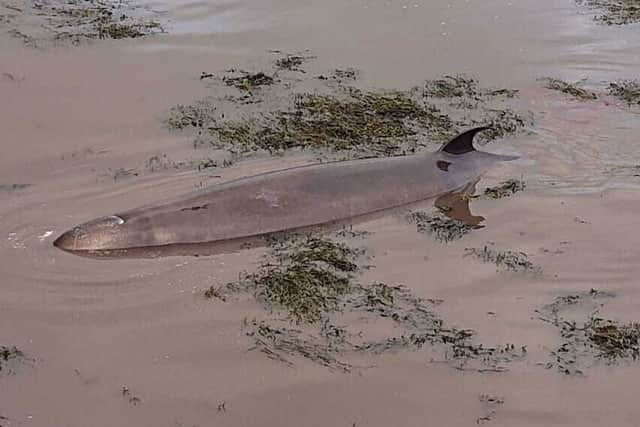Fife whale stranding: Post-mortem planned as second northern bottlenose whale stranded on Scottish coast dies
and live on Freeview channel 276
A second unusual whale stranded on the Scottish coast has died, with post-mortem examinations planned to try and learn more about why they might have become stuck in the first place.
British Divers Marine Life Rescue (BDMLR) first received an emergency call at about 10pm on Tuesday (25 July), alerting them to what was thought to be two harbour porpoises stranded on the rocky shoreline at Culross, Fife.
Advertisement
Hide AdAdvertisement
Hide AdMarine mammal medics arrived on the scene an hour later and confirmed that there were two northern bottlenose whales stranded - a species not often found in the North Sea.
"One was not moving but the other was quite active, both were lying on their sides in the sand and gravel substrate," BDMLR told NationalWorld in a statement.
Both were alive at the time, but one died overnight, they said on Wednesday morning. The second whale had since died as well, BDMLR confirmed, and the rescue charity said their bodies were expected to be removed from the site for post-mortem examinations, by the Scottish Marine Animal Stranding Society.


As of Wednesday morning (26 July), the second whale was still being monitored and was supporting itself in the water, and the charity was waiting on further veterinary advice. "These animals are deep diving species far outside of their normal habitat and their health is likely to be compromised already, based on previous experience of them at strandings," a BDMLR spokesperson said.
Advertisement
Hide AdAdvertisement
Hide AdTwo sets of specialist rescue equipment were brought to the area on Tuesday night in case a rescue might have been possible, but after discussions with the Scottish Marine Animal Stranding Scheme, it was deemed too dangerous to try and re-float the animals in the dark, on an incoming tide.
Coastguard teams supported medics throughout the night as they monitored the whales.
Although bottlenose whales are uncommon in the area, three animals were sighted off the Moray Firth last week. Adults can reach up to 10m, and feed mostly on squid.
This comes just weeks after one of Scotland's biggest ever mass strandings, where more than 50 pilot whales ended up dying onthe Isle of Lewis.
Advertisement
Hide AdAdvertisement
Hide AdMeanwhile, rescuers were also dealing with a devastating mass pilot whale stranding in Western Australia. Volunteers worked frantically for days to try to save dozens of pilot whales that had stranded themselves on a beach, after more than 50 had already died.
Attempts were made to re-float roughly 45 survivors, but on Wednesday they were euthanised after they kept returning to the shallows. Western Australia’s environment minister, Reece Whitby, said it is particularly frustrating because it is not known why the phenomenon occurs.
“What we’re seeing is utterly heart-breaking and distressing,” he told reporters. “It’s just a terrible, terrible tragedy to see these dead pilot whales on the beach.”
Comment Guidelines
National World encourages reader discussion on our stories. User feedback, insights and back-and-forth exchanges add a rich layer of context to reporting. Please review our Community Guidelines before commenting.
